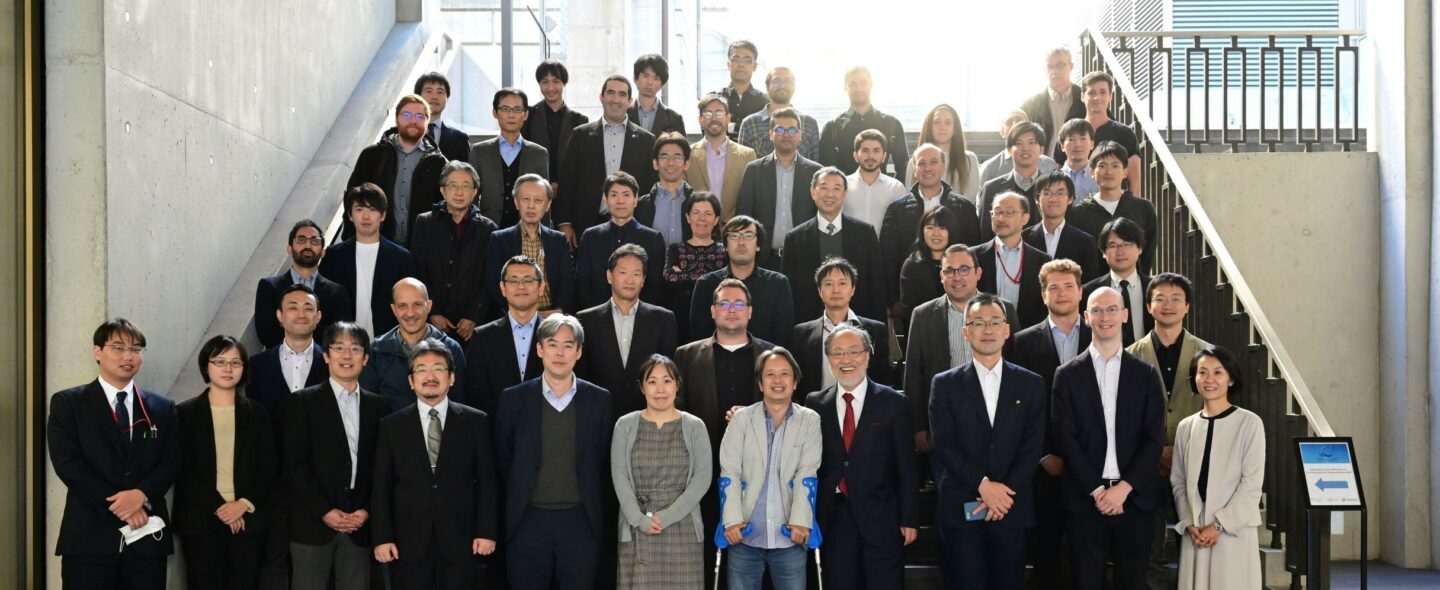
The Japanese-European Workshop on Moonshot program goal 3 “Co-evolving AI and Robots towards 2050” took place in Switzerland from September 21 to 23, 2022. A delegation from Japan consisting of 25 researchers attended the event in order to seek potential collaboration partners from Europe. The delegation was accompanied by representatives from the Japan Science and Technology Agency JST and the Science & Technology Office Tokyo (STO), Embassy of Switzerland in Japan.
The workshop was kicked off at EPFL, the Federal Institute of Technology in Lausanne on September 21. After a warm welcome and introduction of EPFL by Olivier Kuettel (Head of International Affairs, EPFL), Pierre Dillenbourg (Associate Vice President for Education, EPFL) and Jan Kerschgens (Executive Director, Center for Intelligent Systems, EPFL), eleven EPFL laboratory heads active in the fields of artificial intelligence (AI) and robotics provided insight into their research. This was followed by presentations by four Japanese project managers on their works. Lively discussions were held during the networking lunch which was followed by laboratory tours in the afternoon. Representatives of JST also gave explanation on funding schemes for international collaboration.
The workshop continued at the Federal Institute of Technology in Zurich (ETH Zurich). After laboratory visits, Mr. Régis Nyffeler (Deputy Head Bilateral Relations, State Secretariat for Education, Research and Innovation SERI) and Dr. Hideo Nakajima (Director, Department of Moonshot Research and Development Program, JST) opened with greetings and explanations on the workshop’s aim before handing over to Prof. Toshio Fukuda (Program Director of Moonshot Goal 3) for his keynote speech. Researchers from both the European and Japanese sides presented their research in two sessions until the end of the day.
The third session took place after the keynote speech of Prof. Roland Siegwart (Head, Autonomous Systems Lab, Institute of Robotics and Intelligent Systems, Department of Mechanical and Process Engineering, ETH Zurich). The poster session allowed the participants to further engage in exchanges. In the afternoon, the researchers worked in groups to find potential collaboration projects and partners: group one was chaired by Prof. Naonori Ueda (Sub-Program Director of Moonshot Goal 3) and Dr. Alexander Ilic (Executive Director and co-founder ETH AI Center) and focused on AI related research, while Prof. Hideki Hashimoto (Sub-Program Director of Moonshot Goal 3) together with Prof. Marco Hutter (Head, Institute of Robotics and Intelligent Systems / Department of Mechanical and Process Engineering, ETH Zurich) led group two on robot research.
The workshop was concluded by Kyoko Marumo Suzuki (Head, STO) and Dr. Hideo Nakajima of JST with explanation on funding schemes from Switzerland and Japan respectively. Researchers from Japan and Europe will be invited to a follow-up workshop which is planned in Japan in spring 2023 with the aim to elaborate concrete joint research projects with international participation within goal 3 of the Moonshot program.
The workshop was jointly organized by the Japan Science and Technology Agency JST and the Science & Technology Office Tokyo (STO), Embassy of Switzerland in Japan with valuable support from EPFL and ETH Zurich.
The Moonshot Research and Development Program was launched by the Japanese Cabinet Office (CAO) in 2019 with the aim to promote high-risk, high-impact R&D based on ambitious and inspiring ideas to achieve disruptive innovation and radical solutions for social issues by 2050. The new framework targets at international collaboration with leading scientist from all around the world in order to realize global human well-being. Moonshot Goal 3 “Co-evolving AI and Robots towards 2050” is one out of nine R&D goals (projects) supported in this framework.


